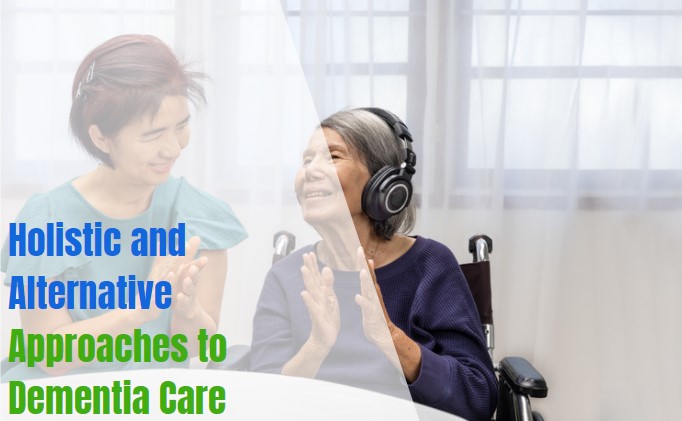
HOLISTIC AND ALTERNATIVE APPROACHES TO DEMENTIA CARE
Dementia care traditionally focuses on medical treatments and therapies, but holistic and alternative approaches are gaining recognition for their potential to improve quality of life for individuals with dementia. These approaches emphasize overall well-being, incorporating physical, emotional, and spiritual health. In this blog, we will explore various holistic and alternative methods that can complement conventional dementia care.
-
Music Therapy
Overview: Music therapy involves using music to address physical, emotional, cognitive, and social needs. It can be particularly effective in dementia care, as music can stimulate memories and emotions.
Benefits:
- Emotional Well-being: Music can evoke positive emotions and reduce feelings of anxiety, depression, and agitation.
- Cognitive Stimulation: Listening to familiar songs can trigger memories and help maintain cognitive function.
- Social Interaction: Group music therapy sessions encourage socialization and connection with others.
Implementation:
- Incorporate favorite music from the individual’s past.
- Use live music, recordings, or instruments for active participation.
-
Art Therapy
Overview: Art therapy uses creative activities like painting, drawing, and sculpting to help individuals express themselves and process emotions.
Benefits:
- Emotional Expression: Art provides a non-verbal outlet for expressing feelings and thoughts.
- Cognitive Engagement: Artistic activities stimulate creativity and can help maintain cognitive skills.
- Stress Reduction: Engaging in art can be relaxing and help reduce stress and anxiety.
Implementation:
- Offer various materials and encourage free expression.
- Focus on the process rather than the final product.
-
Aromatherapy
Overview: Aromatherapy uses essential oils derived from plants to promote physical and psychological well-being.
Benefits:
- Relaxation and Stress Relief: Essential oils like lavender and chamomile can have calming effects.
- Improved Sleep: Aromatherapy can help improve sleep quality, which is often disrupted in dementia patients.
- Mood Enhancement: Certain scents can uplift mood and reduce symptoms of depression and anxiety.
Implementation:
- Use essential oils in diffusers, massages, or baths.
- Ensure oils are used safely and in appropriate concentrations.
-
Pet Therapy
Overview: Pet therapy, or animal-assisted therapy, involves interaction with trained animals to improve emotional and physical health.
Benefits:
- Emotional Comfort: Animals can provide companionship, reduce loneliness, and improve mood.
- Social Interaction: Engaging with animals can encourage socialization and verbal communication.
- Physical Activity: Interaction with pets can increase physical activity and mobility.
Implementation:
- Introduce visits from therapy animals or consider the benefits of having a pet in the home.
- Ensure the animal is trained and well-suited for interactions with individuals with dementia.
-
Reminiscence Therapy
Overview: Reminiscence therapy involves discussing past experiences, memories, and events, often with the aid of photos, music, or other memorabilia.
Benefits:
- Cognitive Stimulation: Encourages memory recall and cognitive engagement.
- Emotional Connection: Helps individuals connect with their identity and life story.
- Social Interaction: Facilitates conversation and bonding with caregivers and family members.
Implementation:
- Use photos, music, and objects from the person’s past to stimulate memories.
- Create a “memory box” or scrapbook as a therapeutic tool.
-
Massage and Touch Therapy
Overview: Massage and touch therapy involve physical contact to provide comfort and alleviate physical discomfort.
Benefits:
- Relaxation: Reduces muscle tension and promotes relaxation.
- Pain Relief: Can alleviate pain and discomfort associated with muscle stiffness or other conditions.
- Emotional Comfort: Provides a sense of security and emotional comfort through gentle touch.
Implementation:
- Incorporate gentle massages into the daily routine.
- Use light touch or hand-holding to provide comfort and connection.
-
Herbal and Nutritional Supplements
Overview: Some herbal supplements and dietary changes are believed to support cognitive health and overall well-being.
Benefits:
- Cognitive Support: Supplements like ginkgo biloba, omega-3 fatty acids, and curcumin are thought to have neuroprotective properties.
- Overall Health: Proper nutrition and supplementation can support general health and well-being.
Implementation:
- Consult with healthcare providers before starting any supplements to ensure safety and efficacy.
- Incorporate a balanced diet rich in fruits, vegetables, whole grains, and lean proteins.
-
Mindfulness and Meditation
Overview: Mindfulness and meditation involve practices that promote relaxation, focus, and awareness of the present moment.
Benefits:
- Stress Reduction: Helps manage stress and anxiety, which can be common in dementia.
- Emotional Well-being: Promotes a sense of calm and emotional balance.
- Cognitive Engagement: Encourages mental focus and clarity.
Implementation:
- Introduce simple breathing exercises and guided meditation sessions.
- Use mindfulness techniques during daily activities to promote awareness and relaxation.
Conclusion
Holistic and alternative approaches can offer valuable benefits to individuals with dementia, enhancing their quality of life and complementing traditional medical care. By integrating these methods, caregivers can provide a more comprehensive, person-centered care experience. It’s essential to consult with healthcare professionals before implementing any new therapies, especially those involving supplements or significant lifestyle changes. Each individual is unique, and care plans should be tailored to their specific needs and preferences.

